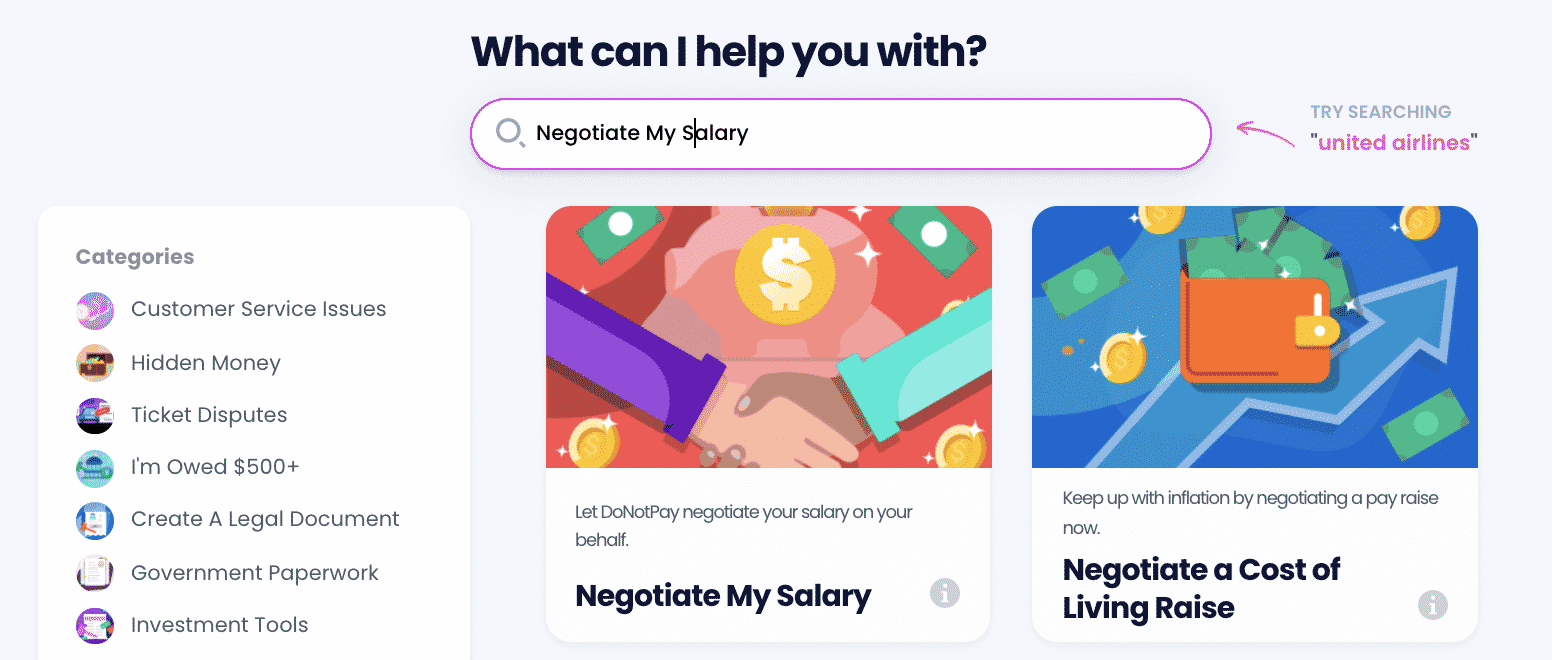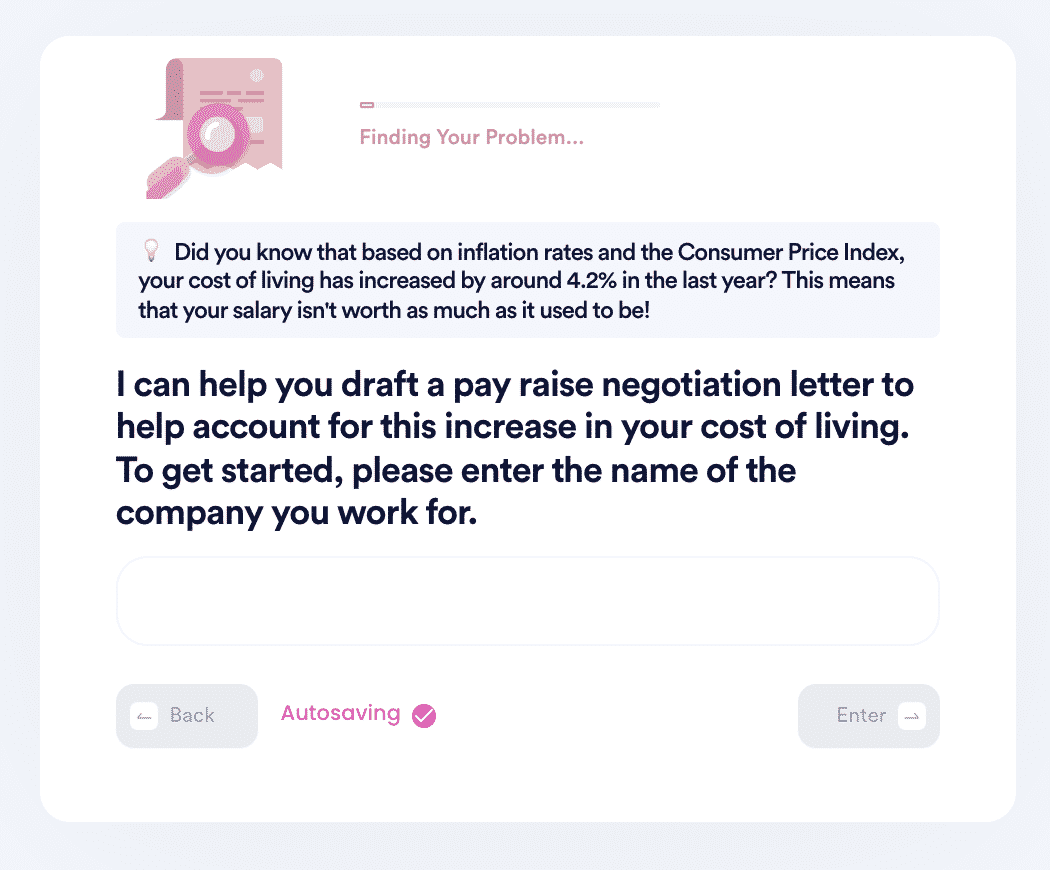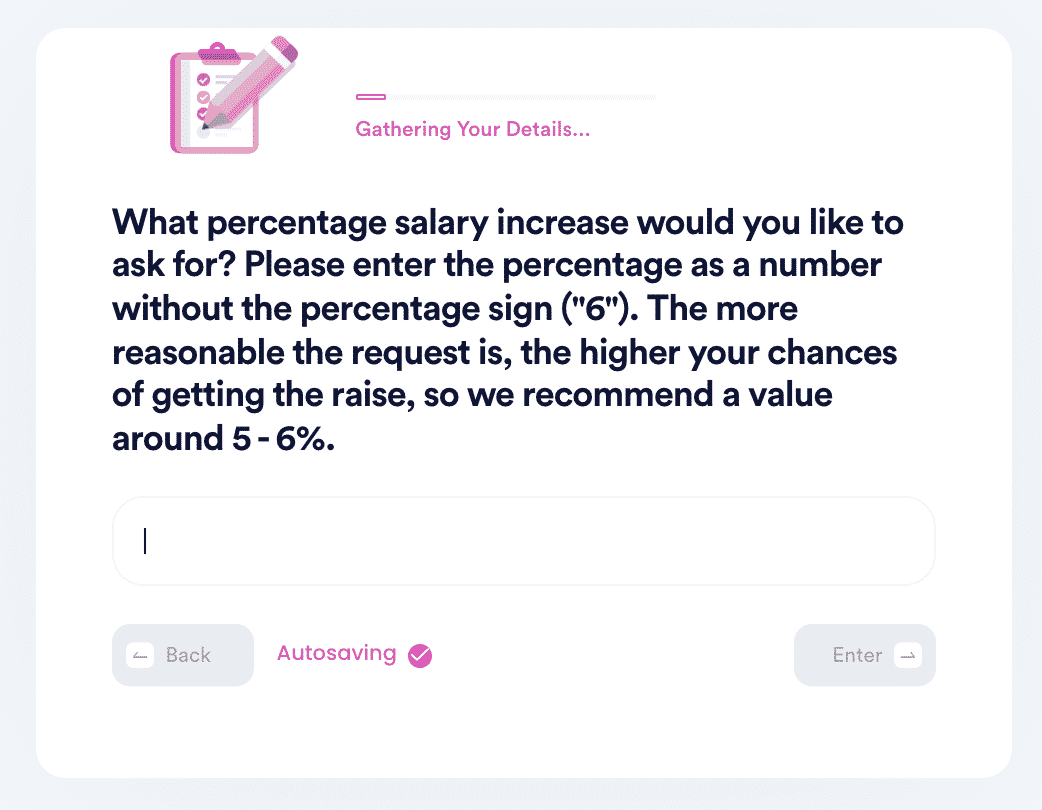Negotiating Your Contractor Salary the Easy Way
Everything is going up in today’s economy. With the rising cost of living, it only makes sense that a contractor like you gets paid more. If you’re wondering , you are in the right place.
Learn more about how to represent yourself effectively, how to negotiate for better pay, and how DoNotPay can help you with the negotiation process.
How to Negotiate a Contractor Salary
There are a few different ways you can It all depends on your circumstances and what you feel is right for your unique situation.
Not all salary negotiations are the same. Based on your circumstances, you may negotiate your salary over the phone, via email, or in person. However, you choose to present your case for higher pay, do it with confidence, and know that you are worth it.
Tips for Negotiating Contract Rates
There are certain things to remember when you want to negotiate contract rates. It's important to keep all of these things in mind when you feel it is time to start the negotiation process.
- Determine what your absolute minimum acceptable rate should be.
- Do some research and know your industry so that you are aware of what is acceptable and what is not.
- Know your value.
- Factor in all aspects when you're doing your research, such as where you live.
- Start with a higher rate than your acceptable minimum.
What Types of Things Can You Negotiate?
There are some things that are appropriate to negotiate, and there are some things that are not appropriate. A lot of people wonder what sorts of things can be negotiated—you're not alone.
Here are a few examples of acceptable negotiation topics:
- Salary
- Paid time off
- Health insurance
- Benefits
- Flexible hours
If you have to commute long distances, that can be another factor to bring up in a negotiation. Mileage is a normal expense to ask for compensation during a negotiation. Don't allow yourself to be manipulated or short-changed just because you are a contractor and not a regular full-time employee.
What Is Normal for Negotiating Salary With a Recruiter?
Most people ask themselves questions such as "when is a good time to negotiate salary," and "how much of a raise to ask for." Here are a few ideas to keep in mind.
- Ask for benefits and extra perks.
- Don't start out by asking for more money right away.
- Don't be demanding, but make sure that you are confident and not afraid to ask for what you want.
- Sell yourself throughout the negotiation.
When to Negotiate for a Higher Salary as a Contractor
There are a few different reasons a person would need a raise, even with contractor work. Here are a few of the most common reasons to ask for a raise:
- Cost of living increases.
- You increase your skills or education for your job.
- Your job duties have increased or changed.
- You have taken on more responsibilities in your role.
Salary Negotiation Tactics
When you decide that it is time for you to negotiate a better salary, there are certain things you need to articulate with confidence. Always make sure that the information you give is correct. You can maximize the potential outcome of your when you include the following:
- Cite the average salary in your area for your specific role in the industry.
- If you have any travel expenses or moving expenses related to your job, be sure to bring them up.
- Don't be afraid to mention other job offers and the perks of working with other companies.
- Keep reminding them of your skills and qualifications as well as the experience that you have.
- Discuss the cost of living and any increases in the Consumer Price Index.
If you’re planning to try negotiating for a contractor salary increase by yourself, here are a few important things to consider:
What to Say When Negotiating Your Salary |
What to Avoid When Negotiating Your Salary |
| Negotiate for your job’s fair market value, especially if the initial salary offer is way below the market/industry salary trends for the same job level or description. | Renegotiating when you've already accepted a lower salary offer. Once you’ve accepted an offer, it’s too late to negotiate. |
| Point out your skills and experience level and how these may add value to your team and the company. | Volunteering information about your current salary is a big no-no. You want to earn based on your market value and potential, not on what you’re currently earning. |
| Weigh in on the perks and benefits, and additional incentives being offered, and allow them to consider how upgrading these (instead of the salary, if they won’t budge on that) may be a great compensation package for you to consider. | Presenting reasons that are not justifiable in a salary negotiation. Living expenses, loans, and debts, to name a few, are not good reasons for negotiating for a higher salary. Rather, point out instead, your potential contribution and the potential value you offer to your team and the company. |
| Weigh in on the nature of the job and how you may be able to provide value to your team and to the company. | Reacting badly when told they are giving you their best offer. If it’s lower than what you expect for your worth, better for you to politely decline right away. |
| If the offer isn’t satisfactory, be direct but polite in declining. Always be willing to walk away if the salary offered is not fair. | When the other side becomes hostile and argumentative. While this isn’t likely to happen, it might, and one big reason would be that they want you but won’t offer you any more than their initial offer. The only way out is to be courteous and to politely decline. |
Oftentimes, you can be successful with negotiating salary by yourself. However, there are times when you do need help to negotiate. In those cases, DoNotPay can help.
DoNotPay's Negotiation Product Can Help You
You already know that DoNotPay is a revolutionary, user-friendly platform that can help you with countless everyday issues. Well, DoNotPay also offers a salary negotiation product.
- Not sure where to start negotiating?
- Wondering how to present an awesome negotiation?
- Do you want your salary negotiation to be super professional but have no clue how to start?
DoNotPay can generate a comprehensive, all-inclusive salary negotiation document for you. You don't have to stress over how to present your case during a negotiation anymore.
DoNotPay is on your side. You deserve fair pay for what you do for a living.
How to Use DoNotPay to Negotiate a Better Salary
So you have decided that it is time to negotiate a better salary. Let DoNotPay do it for you. Follow the steps below and get a professional, informative, well articulated negotiation letter to present.
- Search "negotiate my salary" on DoNotPay.

- Enter the name of your company and the industry you work in, so DoNotPay can find the right wage statistics for your role.

- Answer a series of questions regarding your qualifications and achievements, relocation expenses, and other job offers if applicable.

- Enter the new base salary you would like to request.

This is all it takes to enjoy the easy-to-use product. No worrying, no hassle, just a complete and professional negotiation document to present to your company or recruiting agency.
What Else Can DoNotPay Do?
Here are other areas where DoNotPay can help you:
- Fight workplace discrimination
- Cancel any service or subscription
- File a complaint against any company
- Get chargebacks and refunds
- Reduce property taxes
Check out the website to learn more!


